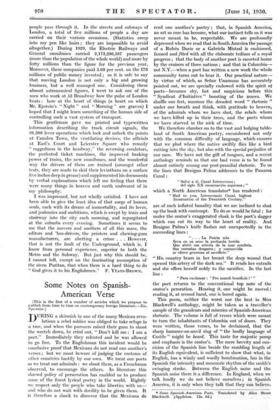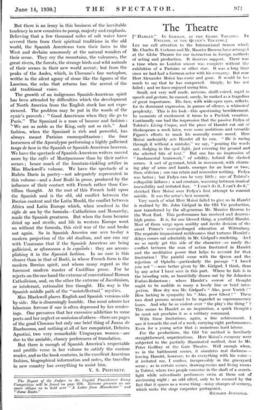Some Notes on Spanish- American Verse
[This is the first of a number of articles which we propose to publish from time to time on contemporary foreign literature.—En. Spectator.]
DURING a skirmish in one of the many Mexican revo- lutions a rebel soldier was obliged to take refuge in a tree, and when the pursuers raised their guns to shoot the wretch down, he cried out, " Don't kill me : I am a poet." Immediately they relented and he was allowed to go free. To the Englishman this incident would be conclusive proof that Mexicans do not read one another's verses ; but we must beware of judging the customs of other countries hastily by our own. We treat our poets as we treat our admirals : we shoot them, as a Frenchman observed, to encourage the others. In literature this shrewd policy of persecution has enabled us to produce some of the finest lyrical poetry in the world. Rightly we respect only, the people who take liberties with us7-- and who do not wait with docility to be given them. It is therefore a shock to discover that the Mexicans do read one another's poetry ; that, in Spanish America, an art so rare has become, what our instinct tells us it was never meant to be, respectable. We are profoundly depressed when we read that in South America the passage of a Ruben Dario or a Gabriela Mistral is cushioned, fanned and feted with all the elaborate tedium of a royal progress ; that the body of another poet is escorted home by the cruisers of three nations ; and that in Columbia— not N.Y.—when a poet has written a new work the whole community turns out to hear it. Our practical nature— by virtue of which, as Senor Unamuno has accurately pointed out, we are specially endowed with the spirit of poets—becomes shy, hot and suspicious before this " Syndicat d'Initiative " boosting of the muses. We shuffle our feet, murmur the dreaded word " rhetoric " under our breath and think, with gratitude to heaven; of the admirals whom we have shot, the rebels whom we have killed up in their trees, and the poets whom we have starved in the nick of time.
We therefore clamber on to the vast and bulging table- land of South American poetry, encumbered not only with the common difficulty of language, which ensures that we plod where the native swiftly flies like a bird cutting into the sky, but also with the special prejudice of our race. We have not the gift of tongues, and a recent anthology reminds us that our bad verse is to be found almost entirely among our post-prandial rhetoric. To us the lines that Benigno Palma addresses to the Panama Canal
" Salve a ti, Canal Interoceana ; del siglo XX encarnacion suprema ; "
which a North American translator* has rendered :
" Hail to you, Interoceanic Canal, highest Incarnation of the Twentieth Century."
are of such inflated banality that we are inclined to shut up the book with contempt. To do so would be fatal ; for under the orator's exaggerated cloak is the poet's dagger which can cut its way to the heart of reality. And Benigno Palma's knife flashes out unexpectedly in the succeeding lines • • • La Patric mia
lleva en su seno la profunda herida Que abri6 esa arteria de la mar sotnbrla.
Sus entraflas desgarra ; y conmovida se ofrece generosa al sacrificio.
" His country bears in her breast the deep wound that opened this artery of the dark sea." It rends her entrails and she offers herself nobly to the sacrifice. In the last line :
" Para exclamar Pro mundi beneficio ! '
the poet returns to the conventional top note of the orator's peroration. Hearing it, one might be moved ; reading it, at second hand, one is bored again.
This poem, neither the worst nor the best in 'Miss Blackwell's anthology, might be taken as a traveller's sample of the grandeurs and miseries of Spanish-American rhetoric. The volume is full of verses which were meant to turn the inhabitants of Columbia out of .doors. They were written, those verses, to be declaimed, that the sharp hammer-on-anvil ring of " the lordly language of Castile " might be heard. This taste for majestic poinp and emphasis is the orator's. The mere brevity and con- cision of the Spanish line beside the rambling length of its English equivalent, is sufficient to show that what, in English, has a windy and woolly bombination, has in the Spanish the intensity and mesmeric 'rhythm of the smith's swinging stroke. Between the English noise and the Spanish noise there is a difference. In England, when we talk loudly we do not believe ourselves ; in Spanish Anierica, it is only when they talk that they can believe, * Some Spanish-American Poets. Translated by Alice Stone
Blackwell. (Appleton. 12s. 6d.) _
But there is an irony in this business of the inevitable tendency in new countries to pomp, majesty and emphasis.
Believing that a few thousand miles of salt water have severed them from their spiritual traditions in the old world, the Spanish Americans turn their faces to the West and declaim sonorously at the natural wonders of their scene. They cry the mountains, the volcanoes, the great rivers, the forests, the strange birds and wild animals of their scenes in their new world accent; but from the peaks of the Andes, which, in Chocano's fine metaphor, writhe in the silent agony of stone like the figures of the Laocoon, the echo that returns has the accent of the old traditional voice.
The growth of an indigenous Spanish-American spirit has been attended by difficulties which the development of North America from the English stock has not expe- rienced. The problem may be put in the words of the cynic's proverb : " Good Americans when they die go to Paris." The Spaniard is a man of honour and fashion : `` We are as noble as the King, only not so rich." And fashion, when the Spaniard is rich and powerful, has always meant Parisian cosmopolitanism : the four horsemen of the Apocalypse performing a highly gallicized tango de luxe in the Spanish or Spanish-American heavens.
We have the spectacle of Spanish-American writers moved more by the cafés of Montparnasse than by their native scenes ; hence much of the fountain-tinkling artifice in Miss Blackwell's volume. We have the spectacle of a Ruben Dario in poetry—not adequately represented in this volume—and a Jose Rode) in prose, produced by the influence of their contact with French rather than Cas- tillian thought. At the root of this French hold upon the Spanish soul is the old, old conflict between the Iberian content and the Latin Mould, the conflict between Africa and Latin Europe which, when resolved in the siglo de oro by the formula—Catholicism and Monarchy, made the Spanish greatness. But when the form became dried up and sterile, and life in western Europe went on without the formula, this civil war of the soul broke out again. So in Spanish America one sees to-clay a modern projection of the old dualism, and one can say with Unamuno that if the Spanish Americas are being gallicized, se afrancesan a la espartola : they are accom- plishing it in the Spanish fashion. In no case is this clearer thari in that of Bodo, in whose French form is the modern Iberian spirit, and whom many regard as the foremost modern master of Castillian prose. For he rejects on the one hand the extreme of conventional Roman Catholicism, and, on the other the extreme of Jacobinism, or intolerant, rationalist free thought. His way is the Spanish middle path of the " unintellectual" mystics.
Miss Blackwell places English and Spanish versions side by side. She is disarmingly humble. One must admire her laborious fervour if one is often depressed by her render- ings. One presumes that her excessive addiction to some poets and her neglect or omission of others—there are pages of the good Chocano but only one brief thing of Juana de Ibarbourou, and nothing at all of her compatriot, Delmira Agustini, two very remarkable Uruguayan women—are due to the amiable, chancy preferences of translation.
But there is enough of Spanish America's respectable and prolific verse in her volume to satisfy the curious reader, and as the book contains, in the excellent American fashion, biographical information and notes, the traveller in new country has everything to assist him.
V. S. PRITCHETT.



































 Previous page
Previous page